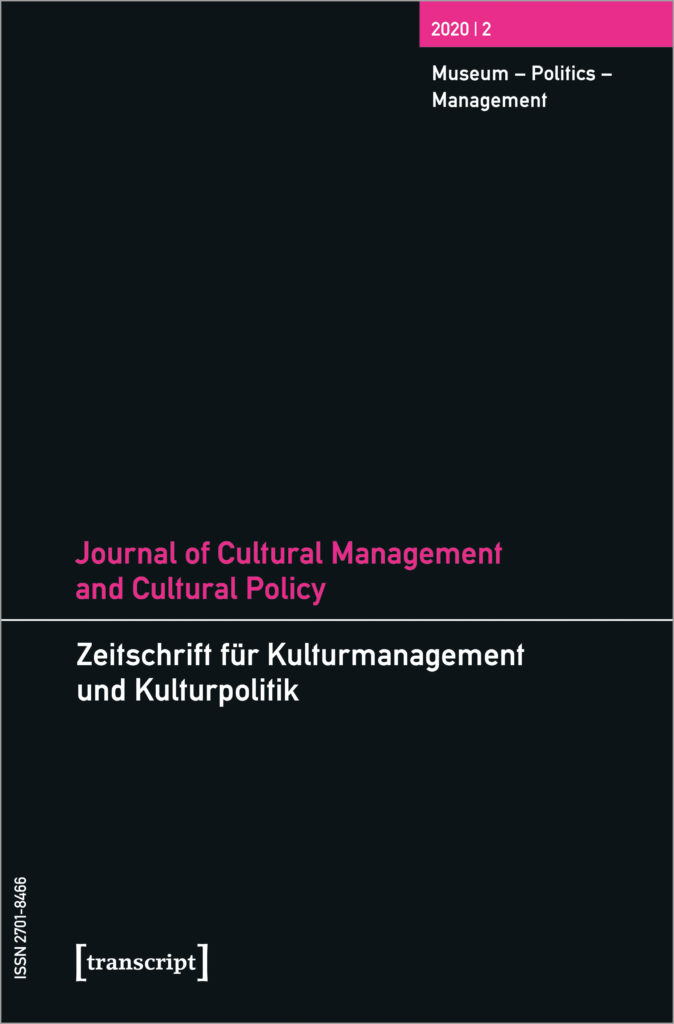Essay
Retooling for the Revolution: Framing the Future of Museum Management After COVID-19
Abstract
In March 2020, COVID-19 descended on American museums, exposing financial and operational fragility. It also exposed the limitations, harms and inequities of standard practices in museum management. The result was a widespread deaccessioning of staff, gutting departments that directly serve audiences and disproportionately impacting workers of color – a regressive step in a field moving toward decolonized and audience-centered practice. Despite the retrenchment, signs also indicate a revolution in progress. Key thinkers have argued that museums are making a long-term paradigm shift, from “being about something to being for somebody” (WEIL 1999). Responses to COVID-19 suggest that this shift has yet to penetrate the ‘deep structures’ of museum management. This article recognizes a museum “paradigm crisis” in which old and emerging systems coexist and conflict. Arguing that museums have neglected human-entered management strategies, it puts forward Bolman and Deal’s ‘Four Frames’ concept to build the managerial toolkit. Finally, it identifies priorities needed in an emerging paradigm: racial and cultural equity and diversity, compensation and wage equity, smarter work practices, and community care.
Keywords
2020 (2)
Museum - Politics - Management

Related Articles
Auf dem Weg zum Publikum der Zukunft
Die neue mobile Ausstellung des Jüdischen Museums BerlinYearbook for Culture Management 2012
Case Study
Kulturmanagement als Organisation agonaler Kompetition
Yearbook for Culture Management 2011
Research Article
Journal of Cultural Management 2018 (2)
Research Article
Der ‚Blick hinter die Fassade‘
Ansätze einer Tiefenanalyse von Evaluationen im MuseumssektorJournal of Cultural Management 2016 (2)
Research Article
Yearbook for Culture Management
Essay
Journal of Cultural Management 2019 (1)
Essay
© 2026, Journal of Cultural Management and Cultural Policy
Keywords
- Aesthetics
- Higher Education
- Cultural Diplomacy and Foreign Cultural Policy
- Occupation
- Career and Professional Role
- Audience Development
- Audience Studies and Visitor Studies
- Visitor Motivations
- Business
- Covid Pandemic
- Democracy
- Digitalization
- Diversity
- Third Sector
- Empirical Aesthetics
- Development
- Ethics
- Evaluation
- Field Theory
- Festival
- Film
- Federalism
- Community Arts
- Societal Change
- Ideology
- Staging
- Career
- Communication
- Concert
- Creative Industries
- Creativity
- Crisis
- Culture
- arts organizations, cultural organizations
- Cultural Participation
- Cultural Change
- Fincancing The Arts
- Cultural Promotion Law
- Cultural History
- Cultural Management
- Cultural Economy
- Cultural Organizations
- Art Education
- Cultural Policy
- Cultural Production
- Cultural Sociology
- Art Education
- Cultural Understanding
- Arts Administration
- Cultural Industry
- Cultural Sciences
- Art
- Art Field
- Arts Research
- Artists
- Artistic Research
- Artistic Reputation
- Arts Management
- Arts Organizations
- Art education
- Arts Marketing
- Arts Administration
- Curating
- Leadership
- Literature
- Advocacy
- Management
- Marketing
- Market
- Media
- Methods Development
- Mexico
- Monumentalizing
- Museum
- Music
- Non-Visitor Studies
- Opera
- Orchestra
- Organization
- Political Expression
- Post-truth Politics
- Professional Role
- Audience
- Audience Development
- Law
- Government
- Role
- Socially Engaged Art
- Social Cohesion
- Social Change
- Social Cohesion
- Non-visitor Socio-demographics
- Socioculture
- State
- Symbolic capital
- Dance
- Participatory Justice
- Theatre
- Theatre Governance
- Theory Development
- Tourism
- Transformation
- Survey
- Entrepreneurship
- Urbanism
- Civil Society


